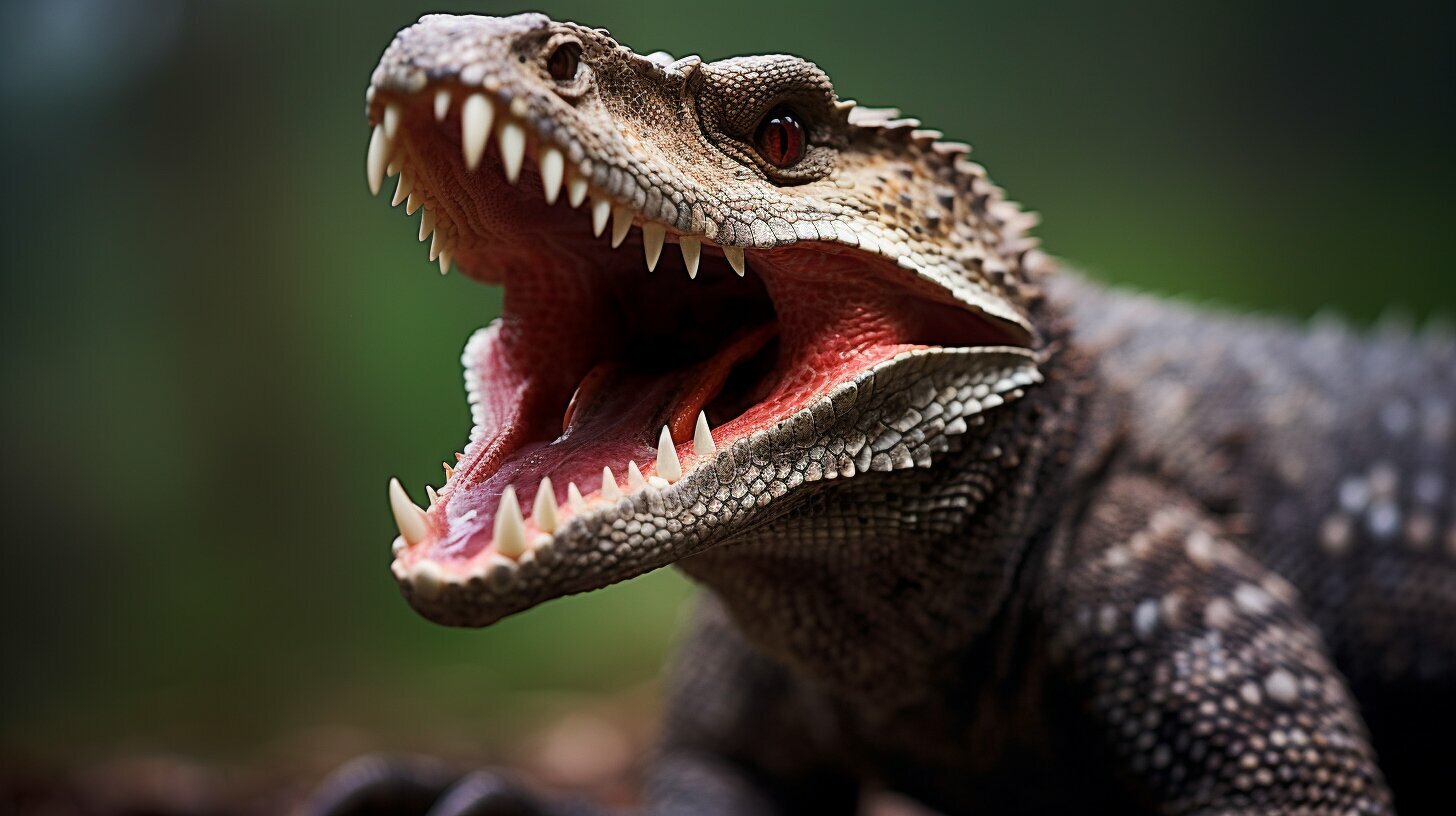Lizards are fascinating creatures, but one question that often comes to mind is, do lizards bite?
Factual data: Lizards can bite, but it is rare and usually occurs when they feel threatened or are manipulated. Most lizard bites do not cause serious health problems. The wall lizard or gecko, found in most homes, is not poisonous. Lizard bites can cause pain, but they are not poisonous. Lizards can carry harmful bacteria like salmonella, so it is important to practice proper hygiene when handling them. Lizards may bite if they feel provoked or scared. It is important to handle them slowly and avoid startling them. If bitten by a lizard, it is important to clean and disinfect the wound to prevent infection.
Key Takeaways:
- While lizards can bite, it is rare and usually only occurs if they feel threatened or are manipulated.
- Most lizard bites do not cause serious health problems.
- The wall lizard or gecko, commonly found in homes, is not poisonous.
- Lizards can carry harmful bacteria like salmonella, so proper hygiene is important when handling them.
- It is important to handle lizards slowly and avoid startling them to minimize the risk of being bitten.
Understanding Lizard Biting Behavior
To better understand lizard biting habits, it is crucial to explore their behavior and learn how to minimize the chances of being bitten. While lizards are generally not aggressive and only bite when they feel threatened or provoked, it is still important to handle them with care.
Lizards have a natural instinct to protect themselves, and if they feel scared or manipulated, they may resort to biting as a defense mechanism. This is particularly true for wild lizards or those that have not been properly socialized. Therefore, it is important to approach lizards slowly and avoid sudden movements that may startle them.
To avoid lizard bites, it is vital to practice proper handling techniques. This includes supporting their body with gentle and balanced hand movements, never grabbing them by the tail, and allowing them to move freely without restraining them. By respecting their boundaries and providing a calm environment, you can reduce the likelihood of being bitten.
Another important aspect to consider when interacting with lizards is maintaining good hygiene. Lizards, like many reptiles, can carry harmful bacteria such as salmonella. Therefore, it is crucial to wash your hands thoroughly after handling them and avoid touching your face or mouth before doing so. Additionally, if you do get bitten by a lizard, it is essential to clean and disinfect the wound to prevent infection.
| Best Ways to Avoid Lizard Bites: |
|---|
| Approach lizards slowly and avoid startling them. |
| Handle lizards gently and never grab them by the tail. |
| Practice good hygiene by washing hands thoroughly after handling lizards. |
| Avoid touching your face or mouth before washing hands. |
| Keep a calm environment for lizards to reduce stress. |
| Clean and disinfect any lizard bite wounds to prevent infection. |
Are Lizards Venomous?
When considering the potential danger of a lizard bite, it’s essential to determine if all lizards are venomous. While some may assume that all lizards possess venom, the truth is that not all lizards are venomous. In fact, the majority of lizards are harmless in terms of venom. It is important to understand the different species and their venomous or non-venomous nature to assess the level of risk associated with lizard bites.
One commonly encountered lizard, the wall lizard or gecko, is a frequent visitor in many homes. These lizards are not poisonous and their bites do not pose a serious health threat. The bites may cause some pain, but they are not venomous. It’s worth noting that lizards can carry harmful bacteria like salmonella, so practicing proper hygiene when handling them is crucial. Remember to wash your hands thoroughly after any contact with lizards.
It’s important to recognize that lizards may bite if they feel provoked or scared. They rely on biting as a defense mechanism when they perceive a threat. To minimize the risk of being bitten, it is advisable to handle lizards slowly and avoid startling them. By approaching them calmly and respectfully, you are more likely to establish a peaceful interaction. However, accidents can happen, and if you do get bitten by a lizard, it is vital to clean and disinfect the wound promptly to prevent infection.
In conclusion, not all lizards are venomous, but it is still important to exercise caution when handling them. While the majority of lizard bites do not result in serious health problems, proper hygiene is essential. By understanding their behavior and respecting their boundaries, you can coexist with lizards safely. Remember, knowledge and gentle handling go a long way in maintaining a harmonious relationship with these fascinating creatures.
Lizards Venomous vs. Non-Venomous Species
| Lizard Species | Venomous |
|---|---|
| Gila Monster | Yes |
| Bearded Dragon | No |
| Green Anole | No |
| Monitor Lizard | Some species are venomous |
Dealing with a Lizard Bite
Unfortunately, accidents happen, and if you find yourself bitten by a lizard, it’s important to know how to handle the situation. While most lizard bites are not serious, it is crucial to take proper care of the wound to prevent infection and minimize any discomfort.
First, it’s important to remain calm and avoid any sudden movements that could further agitate the lizard. Slowly remove yourself from the situation and find a safe space away from the lizard to assess the bite. Wash your hands thoroughly with soap and water before examining the wound.
Clean the bite area gently with mild soap and warm water, ensuring to remove any dirt or debris that may be present. Apply an antiseptic solution or hydrogen peroxide to disinfect the wound. Cover the bite with a clean bandage or sterile gauze pad to protect it from further contamination.
If you experience any symptoms such as severe pain, swelling, redness, or signs of infection like pus or fever, it is recommended to seek medical attention. Your healthcare provider can assess the bite and provide appropriate treatment if necessary.
| Common Lizard Bite Symptoms | Lizard Bite First Aid |
|---|---|
| Redness and swelling around the bite area | Clean the wound with mild soap and warm water |
| Pain or tenderness at the site of the bite | Apply an antiseptic solution or hydrogen peroxide to disinfect the wound |
| Bleeding or bruising | Cover the bite with a clean bandage or sterile gauze pad |
| Signs of infection (pus, increased pain, fever) | Seek medical attention |
Prevention is Key
While dealing with a lizard bite is important, it’s equally crucial to take measures to prevent them from happening in the first place. Here are some tips to minimize the risk of getting bitten by a lizard:
- Avoid handling wild lizards, especially if they appear agitated or threatened.
- When encountering a lizard, give it space and avoid sudden movements that may startle or provoke it.
- Wear gloves or use a towel or cloth when handling lizards, particularly if you need to move or relocate them.
- Teach children about the importance of treating animals with respect and caution.
By following these preventive measures and knowing how to handle a lizard bite, you can ensure a safe and harmonious coexistence with these fascinating reptiles.
Handling Pet Lizards Safely
If you’re considering having a pet lizard or already have one, it’s crucial to understand how to handle them safely to prevent any potential bites. While lizards can bite if they feel threatened or scared, it is important to note that most lizard bites do not cause serious health problems. The popular wall lizard or gecko, commonly found in homes, is not venomous, so bites from these species are not poisonous.
Although lizard bites may cause some pain, it is important to remember that they are not venomous. However, it’s essential to practice proper hygiene when handling pet lizards as they can carry harmful bacteria such as salmonella. To minimize the risk of being bitten, it is recommended to handle lizards slowly and gently, avoiding any sudden movements or actions that may startle them.
If you or someone you know is bitten by a lizard, it is crucial to clean and disinfect the wound promptly to prevent infection. Monitor the area for any signs of swelling, redness, or infection, and seek medical attention if necessary. Remember that prevention is key, so it’s advisable to educate yourself on lizard behavior and provide a stress-free environment for your pet lizard to minimize the likelihood of bites.
By understanding lizard behavior and following proper handling techniques, you can develop a harmonious relationship with your pet lizard based on trust and mutual respect. If you have any concerns or questions about lizard care, it is always best to consult with a reptile specialist or veterinarian who can provide further guidance and support.
FAQ
Q: Do lizards bite?
A: Yes, lizards can bite, but it is rare and usually occurs when they feel threatened or are manipulated.
Q: Are lizard bites dangerous?
A: Most lizard bites do not cause serious health problems. The wall lizard or gecko, found in most homes, is not poisonous. Lizard bites can cause pain, but they are not poisonous.
Q: Can lizards carry harmful bacteria?
A: Yes, lizards can carry harmful bacteria like salmonella. It is important to practice proper hygiene when handling them.
Q: Why do lizards bite?
A: Lizards may bite if they feel provoked or scared. It is important to handle them slowly and avoid startling them.
Q: What should I do if I get bitten by a lizard?
A: If bitten by a lizard, it is important to clean and disinfect the wound to prevent infection.
Q: Can pet lizards bite?
A: Yes, pet lizards can bite. It is important to handle them properly and be aware of their behavior to minimize the risk of being bitten.
Can Lizards Show Aggression Through Biting?
Can lizards show aggression through biting? While it is true that lizards and their emotional capabilities differ from mammals, some reptiles do exhibit aggressive behaviors, including biting. These actions are often driven by territorial defense, fear, or feeling provoked. Understanding lizards’ behavior and providing them with a suitable habitat can help minimize such aggressive tendencies.


One thought on “Do Lizards Bite?”